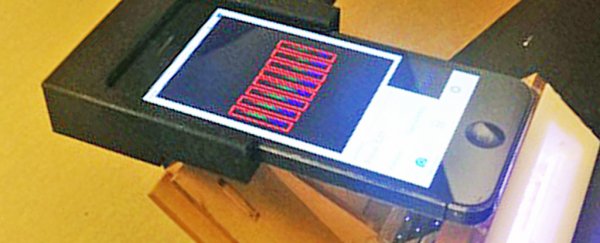Researchers have developed a portable smartphone spectrometer that they say can detect cancers with 99 percent accuracy, and it could enable physicians to diagnose serious illnesses in a totally mobile lab.
By analysing the mix of chemicals in tissue samples, the device detects the biomarker interleukin 6 (IL-6), which has been closely linked to lung, prostate, liver, breast, and carcinoma (skin or tissue) cancers.
While it's not the first smartphone spectrometer to be developed, the device's ability to process eight samples at once means it could be invaluable for doctors working remotely without full hospital facilities.
"The spectrometer would be especially useful in clinics and hospitals that have a large number of samples without on-site labs, or for doctors who practice abroad or in remote areas," says lead researcher Lei Li from Washington State University.
"They can't carry a whole lab with them. They need a portable and efficient device."
Spectrometers work by measuring properties of light within the electromagnetic spectrum. By recording how light shines through or bounces off something, scientists are able to identify harmful formations inside human cells.
 Credit: Washington State University
Credit: Washington State University
In this case, the smartphone spectrometer uses a technique called ELISA (enzyme-linked immunosorbent assay), where changes in antibodies and cell colours are used to identify any biomarkers of disease that might be present.
As you can see in the image above, samples are placed in a grid of miniature wells that are lit from below. The grid is then rapidly scanned using the smartphone camera, held in place with a 3D-printed cradle.
In between the two is a custom-made 'diffraction grating', which splits light beams before they arrive at the phone, allowing detailed spectrum analysis to take place.
Right now, the kit has been built to work with an iPhone 5, but the researchers say they plan to adapt it to work with any model of modern smartphone.
"[Any] smartphone is the focus of our research," Li told ScienceAlert. "As long as it has a good camera, good calculation capability, and [it's] easy to write an app, we can use it."
The system can share data with other researchers wirelessly, and doesn't use much power, but there's an integrated battery pack, which could be pretty useful if you're a long way from civilisation.
So far, the device has only been put to the test on standard lab-controlled cell samples, but the researchers say it's reached the same level of accuracy as more expensive lab equipment, and the next step will be to get approval to run clinical trials with human patients.
In addition to promising lab-quality results at an affordable price – which the researchers estimate will be around US$150 – the team says the biggest advantage is the ability to scan multiple samples at once, which could dramatically speed up pathology in the field.
"With our eight channel spectrometer, we can put eight different samples to do the same test or one sample in eight different wells to do eight different tests," said Li. "This increases our device's efficiency."
It's still early days, and there's no word yet on when this device might become available to other researchers. But if Li's team has success in further testing, it could help to bring mobile cancer detection to many more people who need it.
The findings are published in Biosensors and Bioelectronics.
